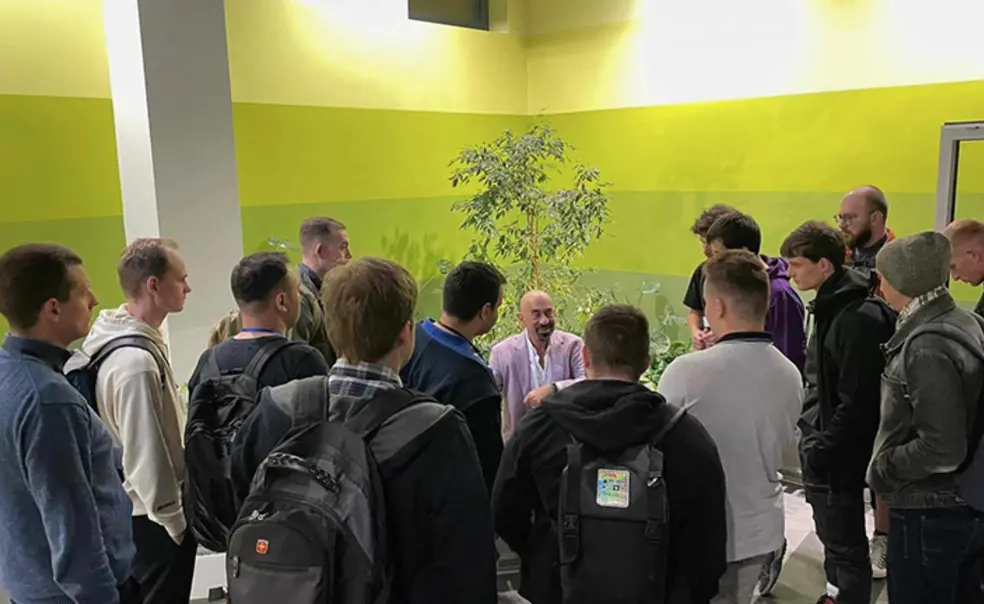David Spergel ’82 Braves Bomb Shelters for Ukrainian Researchers
“We wanted to send a message of hope, letting Ukrainians know that the world scientific community is behind them”
David Spergel ’82 is not merely a world-renowned astrophysicist and an unrelenting champion of scientific inquiry. He is also a brave man.
The Princeton emeritus professor of astrophysical sciences and astronomy and president of the Simons Foundation, Spergel taught at the University for 32 years and served as chair of the astrophysical sciences department for 10 of them. He returned in August from Lviv, a city in western Ukraine, where he was a lead presenter and key organizer of a week-long summer school on data science and applications.
The conference was hosted by the Ukrainian Catholic University (UCU), a collaboration with the U.S. National Academy of Sciences and Spergel’s Simons Foundation, which seeks to advance the frontiers of research in mathematics and basic sciences and underwrote the cost of the program. Its goal was to provide opportunities for study and collaboration for aspiring Ukrainian scientists whose academic work, and ability to travel internationally, have been collateral casualties of the ongoing war.
Spergel presented lectures on “Introduction to Bayesian and Machine Learning in Cosmology” and “Simulation-Based Inference,” as he expected to. Not so expected was the 3 a.m. alert on his cell phone one night, the special app he had installed warning of an impending Russian attack and urging him to get to a bomb shelter. Fortunately, there was a shelter in the basement of his hotel.
“I grabbed a blanket and the bag I’d packed and went down there for an hour,” Spergel said. His phone sent several additional warnings during the week. No attacks in the immediate vicinity materialized, but you take no chances when you are in a war zone. Two days after the conference ended, a Russian missile strike in Lviv killed three people.
“(The whole experience) was somewhat surreal,” Spergel said. “It was a mixture of normal and strange. What was normal was giving lectures to smart students who were asking interesting questions, except the twist was that we were doing the lectures in the basement because it was also a bomb shelter.”
Apart from Spergel, the presenters included Princeton’s Stanislav Shvartsman, professor of molecular biology. A native Ukrainian, Shvartsman delivered his lecture — on “Generative Models for Physics and Cosmology” — remotely, after the U.S. State Department cautioned him that there was a chance he would be detained by Ukrainian authorities, since, with the onset of war, Ukrainian men between the ages of 18 and 60 have been barred from leaving the country.
Sixty students were enrolled in the program. One of them was Roman Kovalchuk, 20, a lifelong resident of Lviv who is studying for his master’s degree in data science at UCU. Kovalchuk said the week was rigorous and intellectually demanding, and one of the best academic experiences of his life, made better still because it featured instructors who were willing to travel to Ukraine during wartime.
“The big thing about this summer school is that all of those amazing people came to Lviv, gave a great deal of inspiration to young scientists and researchers, as well as helped bring their aspirations to a whole new level,” Kovalchuk said.
This was precisely the point, according to Spergel. The Simons Foundation has a long history of helping scientists in need. Since the war began in February 2022, it has supported some 500 Ukrainian scientists in the realms of neuroscience, mathematics, physics, and other disciplines, at a cost of about $2 million annually. In a war-torn nation where fulltime professors might make only $5,000 per year and where spending on scientific research is a paltry half-percent of the gross national product (compared with 2% in many countries with larger economies), the funding makes a big difference. So does the moral and intellectual support for scientists who feel isolated, literally and academically.
“The war just goes on and on and we don’t know how it’s going to end,” Spergel said. “Because (people are coping with) so much weariness and despair, we wanted to send a message of hope, letting Ukrainians know that the world scientific community is behind them. We want to support academic programs in Ukraine (going forward). In the bigger picture, I hope we can lay the basis for in infrastructure to help rebuild Ukrainian science.”












No responses yet